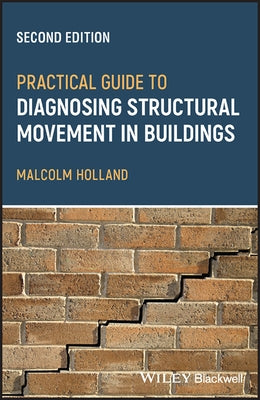Wiley-Blackwell
Practical Guide to Diagnosing Structural Movement in Buildings
Practical Guide to Diagnosing Structural Movement in Buildings
Couldn't load pickup availability
Concise and readable practitioner focused guide to diagnosing the causes of cracks and movement in buildings
The expanded and updated Second Edition of Practical Guide to Diagnosing Structural Movement in Buildings shows how movement can manifest as cracking in the building fabric and provides a rigorous, structured approach to understanding the evidence to ensure the surveyor can confidently diagnose the cause and impact of any structural movement they encounter.
The book is written in four parts, with part one describing the key principles of movement and cracking. Parts two and three describe the main features of common forms of movement and the associated crack patterns, with part two covering causes other than ground or foundation movement and part three covering movement caused by ground or foundations. Part four briefly describes the techniques used to arrest further movement or repair damage caused by movement.
Topics covered in Practical Guide to Diagnosing Structural Movement in Buildings include:
- First principles, including crack patterns and cracks, rotational movement, weak routes, load distribution, and movement and orientation
- Expansion cracking, cavity wall tie corrosion, roof spread, springing from deflected beams, and overloaded floors and beams
- Clay heave, uneven loading, eccentric loading on foundations, drains and drain trenches, differential foundation movement, and load concentrations on foundations
- Repair methods, including stitching in brickwork, reinforcing brick mortar joints, tie bars, restraint straps, underpinning, grouting, and root barriers
Primarily intended for the relatively inexperienced surveyor or engineer, as well as undergraduate students, Practical Guide to Diagnosing Structural Movement in Buildings focuses on identification and diagnosis, helping to correctly diagnose problems while also demonstrating a methodical approach to show and record how the diagnosis was reached, which is critical in client satisfaction.
Author: Malcolm Holland
Publisher: Wiley-Blackwell
Published: 01/04/2023
Pages: 304
Binding Type: Paperback
Weight: 0.78lbs
Size: 8.50h x 5.50w x 0.64d
ISBN: 9781119898726
Share


